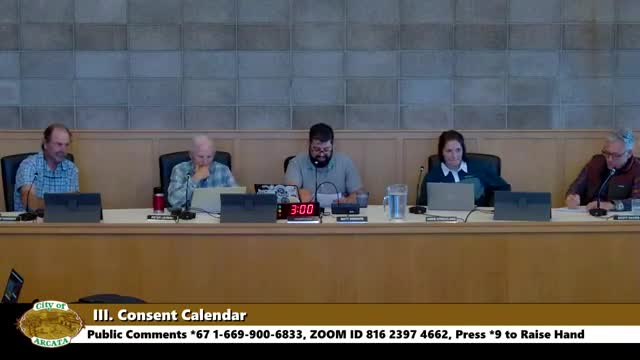Arcadia Planning Commission delays Local Coastal Program update as Coastal Commission review continues
Get AI-powered insights, summaries, and transcripts
Subscribe
Summary
The Planning Commission voted to continue a public hearing on the comprehensive update to Arcadia's Local Coastal Program to Feb. 17, 2026, after staff described ongoing edits and conflicts with the California Coastal Commission over sea-level-rise and accessory dwelling unit policies.
The Arcadia Planning Commission on Oct. 14, 2025 voted to continue its public hearing on a comprehensive update to the city’s Local Coastal Program (LCP) to Feb. 17, 2026, while city staff and California Coastal Commission staff finish negotiating edits.
Community Development Director David Loya told the commission staff “we're gonna need to continue this item 1 more time,” and explained that the city and Coastal Commission are working through a conflict-resolution process over the LCP’s sea-level-rise policies. He said the issues center on how the Coastal Commission interprets the Coastal Act when policies conflict and how those interpretations affect what may be included in Arcadia’s certified LCP.
Why it matters: an LCP, once certified by the Coastal Commission, sets the rules the city uses to regulate land use in the coastal zone. Loya said the city is trying to limit the LCP text to provisions necessary to regulate coastal land use and to move other design and code details into the citywide zoning ordinance to avoid duplication and ongoing maintenance problems.
In the hearing, Loya summarized several substantive points staff has raised with Coastal Commission staff: that the Coastal Commission is reviewing the city’s sea-level-rise policies for consistency with the Coastal Act; that state housing rules for accessory dwelling units (ADUs) and the California Department of Housing and Community Development (HCD) guidance are evolving; and that the city is attempting to identify the “minimum necessary” local code language to satisfy both state ADU requirements and Coastal Act compliance. Loya said the state ADU changes adopted Oct. 14 shorten procedural timelines and require ministerial pathways, explaining that cities must now notify applicants within 15 days whether an application is complete and have 60 days to approve a complete application.
Loya described the sea-level-rise disagreement as largely a policy balancing exercise. He said the Coastal Commission’s general interpretation distinguishes between development built before the Coastal Act (1976) and development built after, with older development more likely to be eligible for hard shoreline protections. City staff are proposing an approach that would try to avoid certain adverse outcomes for infrastructure in vulnerable areas such as the South G and H Streets corridor, where Loya said much of the infrastructure predates 1976. The Coastal Commission, he said, is also weighing water-quality implications and legacy contamination in the same areas when considering whether to allow protective measures.
Staff also described several map and zoning amendments included in the draft LCP. Loya said staff propose changing a small group of parcels near the end of Spear and the start of James Road to residential medium to reflect existing development; adding a new “coastal commercial visitor-serving” designation for parts of the South G and H Streets area (intended to encourage visitor-serving uses such as lodging and restaurants over time); and adding the city-owned Little Lake site into the visitor‑serving designation. He reported that recent excavation and confirmatory sampling at the Little Lake site is ongoing and that crews are filling the site with base rock pending final confirmation sampling results.
Loya outlined the city’s intent to mirror density and essential land‑use limits between the citywide zoning ordinance and the coastal overlay, while keeping design details (for example, upper-floor stepbacks, storefront articulation) out of the LCP when they do not affect coastal resources. He described a categorical-exclusion (CatEx) area—urbanized zones where certain principally permitted activities do not require a Coastal Development Permit—and said that the CatEx references in the current LCP will need to be re-established with the Coastal Commission after certification.
Commissioners asked questions about why the Coastal Commission is involved in building-code-like provisions, how priority between state ADU law and Coastal Act policies will be resolved, and whether the city should wait for further state clarity before proceeding. Loya told the commission that the Coastal Commission must be satisfied because the commission “is basically giving its authority to regulate development, through the Coastal Act to the city of Arcadia,” and that many of the LCP issues are common to coastal cities statewide.
Votes at a glance
- Motion: Approve minutes of the Planning Commission regular meeting on Aug. 12, 2025. Outcome: approved (unanimous among commissioners present). Vote tally: yes 6, no 0, abstain 0. (Motion and second recorded on the record; individual roll-call yes votes were not recorded by name in the minutes beyond the roll call earlier in the meeting.)
- Motion: Continue the public hearing to Feb. 17, 2026. Outcome: approved (unanimous among commissioners present). Vote tally: yes 6, no 0, abstain 0.
What’s next: City staff said they will continue weekly coordination with Coastal Commission staff, post tracked edits to the LCP update on the city website, and return substantive updates to the Planning Commission as business items between now and the continued hearing in February. Loya asked the commission to flag any items they want staff to “hit the brakes” on so staff can relay commission direction in negotiations with Coastal Commission staff.
Meeting context: there were no public speakers on the item. The commission discussed the LCP for an extended portion of the meeting and asked multiple clarifying questions; staff characterized the implementation risk as contingent on Coastal Commission and state agency review and therefore dependent on external approvals.
